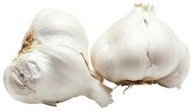
 |
AlliinThe chemical in garlicBy: Eric Coleman, 3rd yr Chemist,
|

hough it is best know as a culinary herb and vampire retardant, the medicinal benefits and claims for garlic have awarded it the name "Wonder Drug among all herbs".
Modern scientists in numerous clinical trials have concluded that Garlic lowers cholesterol lower cholesterol while increasing the level of beneficial HDLs (high-density lipoproteins - the so-called "good cholesterol"), lowers blood pressure, thins the blood by slowing the production of the body's own blood pressure raising hormones (which reduces your risk of heart attack and stroke), and fights bacteria like an antibiotic does.
Garlic is a potent antioxidant that has been found to inhibit tumor cell formation. Researchers have been studying the anti-cancer properties of Garlic since the 1940's and are still doing so. It appears that the herb may prevent cells from turning cancerous by enhancing the body's mechanisms for removing toxic substances.
Garlic's phytochemicals are believed to enhance immunity and the National Cancer Institute (January 1992) reported that people who ate the greatest amount of onions and garlic had the lowest incidence of stomach cancer. Other types of cancer such as skin and colon, have also been reported as being lowered.
When crushed, allicin is released. This chemical element is the component that gives Garlic its strong odor and is mainly responsible for the powerful pharmacological properties of the plant. One medium clove of Garlic can equal the antibacterial action equivalent to 1% penicillin.
Garlic also contains about 0.5% of a volatile oil composed of sulfur-containing compounds. Garlic's sulfur compounds, in addition to Selenium and Vitamins A and C containing compounds, make it a potent antioxidant, protecting cell membranes and DNA from damage and disease.
Although Garlic directly attacks bacteria and viruses, it also stimulates the body's natural defenses against foreign invaders. Garlic is reported to be more effective than penicillin against typhus disease, and works well against strep, staph bacteria, and the organisms responsible for cholera, dysentery and enteritis
It is also generally regarded as a preventative measure for colds, flu and other infectious diseases. Furthermore, scientific studies have shown that garlic stimulates the production of the liver's own detoxifying enzymes which neutralize carcinogens and other environmental toxins. It has also been used to rid the body of intestinal parasites and to treat digestive infections.
Garlic can also been used in treating upper respiratory infections (especially bronchitis), late-onset diabetes, urinary infections, acne, asthma, sinusitis, arthritis, and ulcers. It can be taken with conventional antibiotics to support their action and ward off side effects.